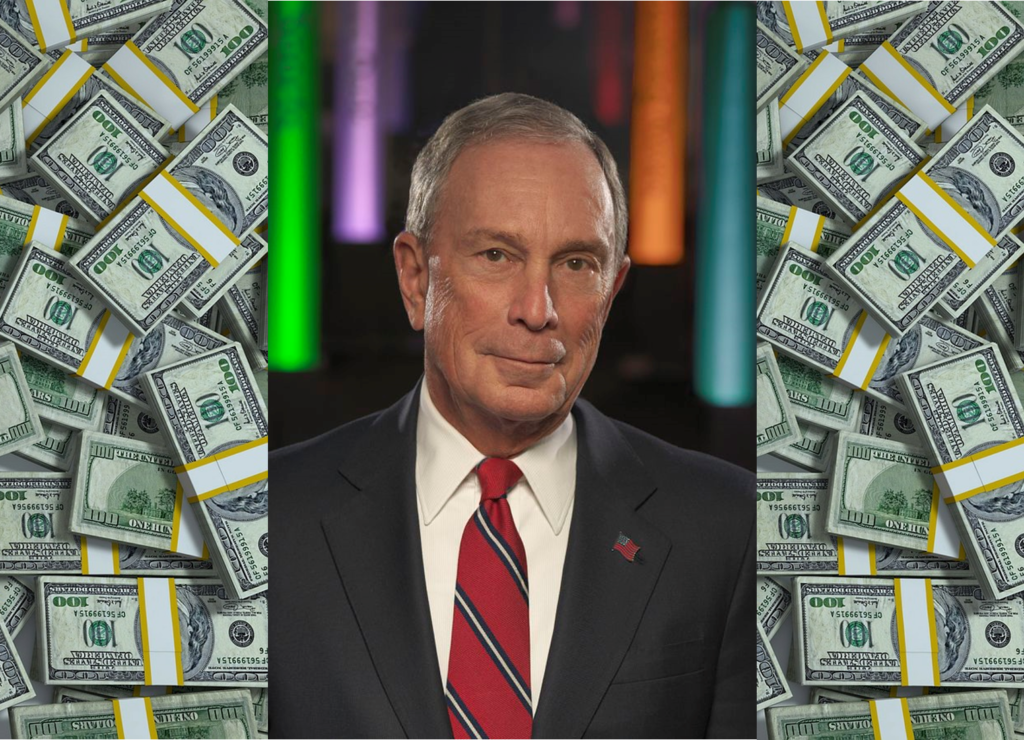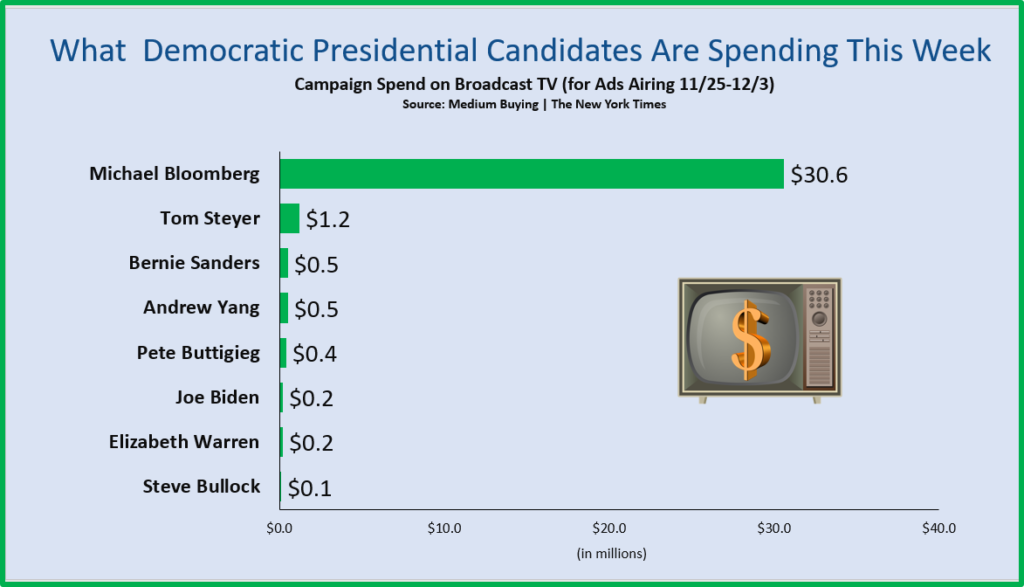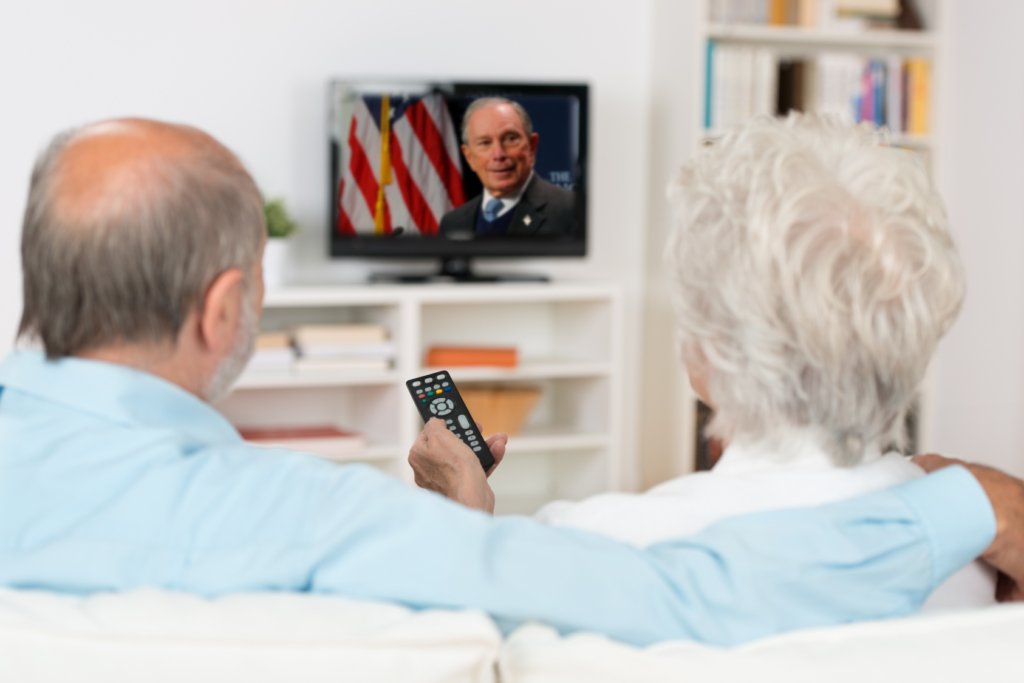
Another weekend and another Democratic candidate throws his chapeau in the Presidential race in an effort to defeat Donald Trump. Last week, it was Massachusetts’ ex-Governor Deval Patrick. And just in time for “Saturday Night Live,” the three-term former mayor of New York City, multi-billionaire Michael Bloomberg has taken the plunge.
Obviously, when you enter the race this late, you’ve got some catching up to do. While no one’s sure what Governor Patrick is thinking, Mayor Bloomberg is doing what he does best – opening up his massive checkbook to carpet bomb the electorate with a new :60 bio ad to introduce him to America. And to make sure we know he’s as serious as a muni bond, he’ll be spending $30 million dollars this week, almost all of it on television.
That’s created quite a stir among the other 73 Democratic candidates, as well as many pundits, wondering about the ethics of trying to buy an election. Of course, this strategy has been tried before, most recently by Jeb Bush and Hillary Clinton, apparently to no avail. But that’s not stopping Mayor Bloomberg whose money machine will now go to work in two dozen states and 100 media markets.
The chart below shows just how clearly gigundous Bloomberg’s campaign spending spree is shaping up to be, compared to his less deep-pocketed Lilliputian competitors:

Here are some of the reactions to Mayor Bloomerberg’s TV media strategy from The New York Times,and other publications:
“I’m disgusted by the idea that Michael Bloomberg or any other billionaire thinks they can circumvent the political process and spend tens of millions of dollars to buy our elections.” – Senator Bernie Sanders
“Swell. Another billionaire who thinks the Democratic nomination is for sale.” – Governor Steve Bullock
“(Voters) are tired of all the money in the world that’s at the top, and I don’t think they want that at the top of our country.” – Senator Amy Klobuchar
“There are limits to what money can do.” – Andrew Yang
“(Bloomberg) has got some personal problems.” – President Donald J. Trump
“Holy S#&@! Where’s radio?” – Erica Farber
I feel your pain, Erica.
At a time when we’re all watching Netflix, Hulu, Amazon Prime, and “The Little Mermaid” on Disney+, Bloomberg is dumping $30 big ones in a medium on the ropes – broadcast television. That may salvage their already horrible year. But is it a good media buy?
If the goal is to reach America, cutting radio out of this massive buy (or apparently not even considering it), sure looks like a missed opportunity. The Bloomberg campaign could certainly get a lot more bang for their bucks, while easily being able to target core voters on the Democratic side, while avoiding conservative talk radio (sorry, Rush).
But the real question surrounding Bloomberg’s campaign strategy once again points to broadcast radio’s image in the advertising and political communities.
Even if radio got its lousy 8% of this massive buy, that Q4 windfall would net out to more than $2 million in radio’s coffers right at the end of another challenging year. And I’m sure many radio companies would toss in live reads and remotes from Bloomberg campaign offices just to sweeten the deal.
What does perhaps the biggest one-week political buy in history (outside a general election) say about radio’s existential problem surrounding the industry’s perceptions? And why aren’t radio broadcasters more up in arms about it?
It’s not as if radio execs aren’t aware of audience perceptions. They know when their Active Rock station has the “too much talk” image, when their Country station  wins the “too many commercials” hill, and how much their Hot AC owns the “plays too many bad songs along with the good ones.”
wins the “too many commercials” hill, and how much their Hot AC owns the “plays too many bad songs along with the good ones.”
But they’re apparently oblivious to the reality that in advertising circles, the “reach king” – broadcast radio – is often a media buyer’s afterthought. Radio’s only hope this quarter is that a bunch of those targeted TV stations in the Bloomberg mega-buy are already sold out this quarter, perhaps necessitating some token ad spend on radio to fill in their GRP goals.
At a time when audio couldn’t be hotter, radio continues to take a back seat to streaming, satellite radio, and podcasting – none of whose reach can touch broadcast radio’s. And as we learned from an Edison study at last week’s Forecast 2020, agencies and media buyers are often hard pressed to even buy ads on many streaming platforms and most satellite radio channels. On top of that, half of Americans have never listened to a podcast. You tell me which is the most efficient, effective audio advertising medium.
Compared to broadcast radio, no other audio medium or platform even comes close. When it comes to reaching the most “ears,” broadcast radio still looks strong despite the exponential acceleration of competition. But don’t try to make that case to marketers or political consultants.
They’ll very likely turn a deaf ear.
I was honored last week to moderate a discussion that concluded Radio Ink’s Forecast 2020 conference in New York City. David Field and Mary Berner were kind enough to handle my questions about broadcast radio’s many challenges – appealing to Gen Z, discovering and growing new talent, incentivizing programmers and sellers for digital growth, and how to best build a podcasting strategy.
But we also had an adult conversation about broadcast radio’s image deficit – with consumers and with advertisers. And like most members of the audience, there is no easy answer or turn-key solution to the problem.
This latest snub by one of the richest men in the land is another sorry sign radio is simply not getting a fair share.
So, it will be interesting when all those politicians traipse into your markets and stop by your radio stations in 2020, eager to speak to their constituents courtesy of your airwaves.
You might ask them to bring along their affidavits. It would be good to know how many supported broadcast radio with their campaign funds during the primaries.
In the meantime, the biggest election of our lifetimes is on the horizon, and already, broadcast radio is playing from behind. Addressing the industry’s image deficit is key if broadcast radio CEOs are smiling come next November.
Maybe radio should steal a page from the Bloomberg playbook as the medium reaches its centennial anniversary milestone.
Cut a TV spot that reintroduces radio to America.
And be sure to set aside $30 million to make sure everyone sees it.
- How Will Radio Fare In The Battle For The Fourth Screen? - April 3, 2025
- Like A Pair Of Old Jeans - April 2, 2025
- What’s Fair Is Fair - April 1, 2025




If Michael Bloomberg were as smart as he is rich he’d be in front of Jerry Lee asap. Jerry Lee is the greatest mind in the marketing business today. His efforts developing “Write To Engage” and the use of facial recognition to test the emotional impact of ads could revolutionize political advertising as they are revolutionizing retail advertising by those broadcasters who do. If there is one major failure that inflicts radio it is poor copy. “Write To Engage” has provided the solution. Politicians will follow and respect the success of radio ads that engage the emotions of our listeners. The alternative is years more of radio getting a few crumbs of political advertising after television stations are sold out. If the RAB commissioned a “Write To Engage” presentation for candidates for public office Michael Bloomberg just might drop his next $30 million on radio.
No argument about the genius of Jerry Lee, Roger. He has championed great radio creative for decades. I’d love to turn him loose on the political opportunity.
I think you all are forgetting one thing in your analysis. His age. This is a demo that thinks since they watch Wheel of Fortune and Blue Bloods on cable or satellite tv, everyone does. Just like how everyone is reading the local newspaper. This is also a product of his age group. They refuse to see progress that’s leaving their staples in the museums. Let him help tv. Remember, you get what you pay for. I’m sure there are many who find his lack of insight a good reason NOT to put him into office.
I “get” the fact that Bloomberg is no kid. But I’m sure his campaign team is younger and more diverse. Radios image isn’t exactly youthful or vibrant either. Again, I maintain it’s an image problem. Out of sight, out of mind.
The first time I heard radio complain about a lack of love from political candidates I was still a hair god. If radio wants more of this busienss, it should do the hard work of calling on decision makers with valid business reasons for using radio. Not reach statistics which don’t apply to targeting primary voters, but applicable, relatable examples which can make its case.
Possible messengers would be Bob Pittman, David Field or Erica Farber. My choice would be Erica who could do a great job of making the case without a bias toward any one company. When was the lost time a “VITO” (very important top officer) from radio called on a political candidate? If the answer is a long time ago, then the problem is radio, not politicians.
I know iHeart has used political consultants, but the results would appear to be checkered. Again, it’s a matter of making political a priority, Bob, and not just hoping for the crumbs.
The TV spot is pretty good.
A lot of people will see it.
Bloomberg would be smart to make a quick radio play.
Solidify his overall TV message with audio frequency.
Maybe just run the last :05 of narrative from the TV spot.
“Jobs creator
Leader
Problem solver
Mike Bloomberg for President”
Good call. Reinforce all those TV GRPs with reminders and reinforcement from radio.
And just to be clear…
The prior comment posted here is not an endorsement of Bloomberg.
I am the most apolitical person I know (No exagerration).
I stand for no political party—only for our medium.
I’ve been saying for years that all candidates sell themselves short by not complimenting their TV exposure with clear and concise audio augmentation.
And don’t get me started about not buying time on music stations.
If more and more races are now decided by the undecideds…
Then get the message to where most of them are.
(It ain’t the “long time listener, first time caller” stations).
Very sharp observations, Marty. I like your thinking here. Now will radio–and politicians–listen? Let’s hope.
You’ve got my vote, Marty!